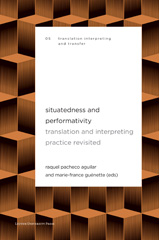Situatedness and Performativity : Translation and Interpreting Practice Revisited
210 p.
Translation practices from the perspectives of identity performance, cultural mediation, historical reframing, and professional trainingTranslating and interpreting are unpredictable social practices framed by historical, ethical, and political constraints. Using the concepts of situatedness and performativity as anchors, the authors examine translation practices from the perspectives of identity performance, cultural mediation, historical reframing, and professional training. As such, the chapters focus on enacted events and conditioned practices by exploring production processes and the social, historical, and cultural conditions of the field. These outlooks shift our attention to social and institutionalized acts of translating and interpreting, considering also the materiality of bodies, artefacts, and technologies involved in these scenes.Contributors: Raquel Pacheco Aguilar (Johannes Gutenberg University of Mainz), Ehsan Alipour (Allameh Tabataba'i University), Audrey Canalès (Université de Montréal), P
aola Gentile (University of Trieste), Marie-France Guénette (Université Laval), Ellen Lambrechts (KU Leuven), Yuan Ping (Hangzhou Dianzi University), Marike van der Watt (KU Leuven), Wenqian Zhang (University of Leeds)This publication is GPRC-labeled (Guaranteed Peer-Reviewed Content). [Publisher's text].
Special access authorizations may apply; please contact us for further information.
-
Información


